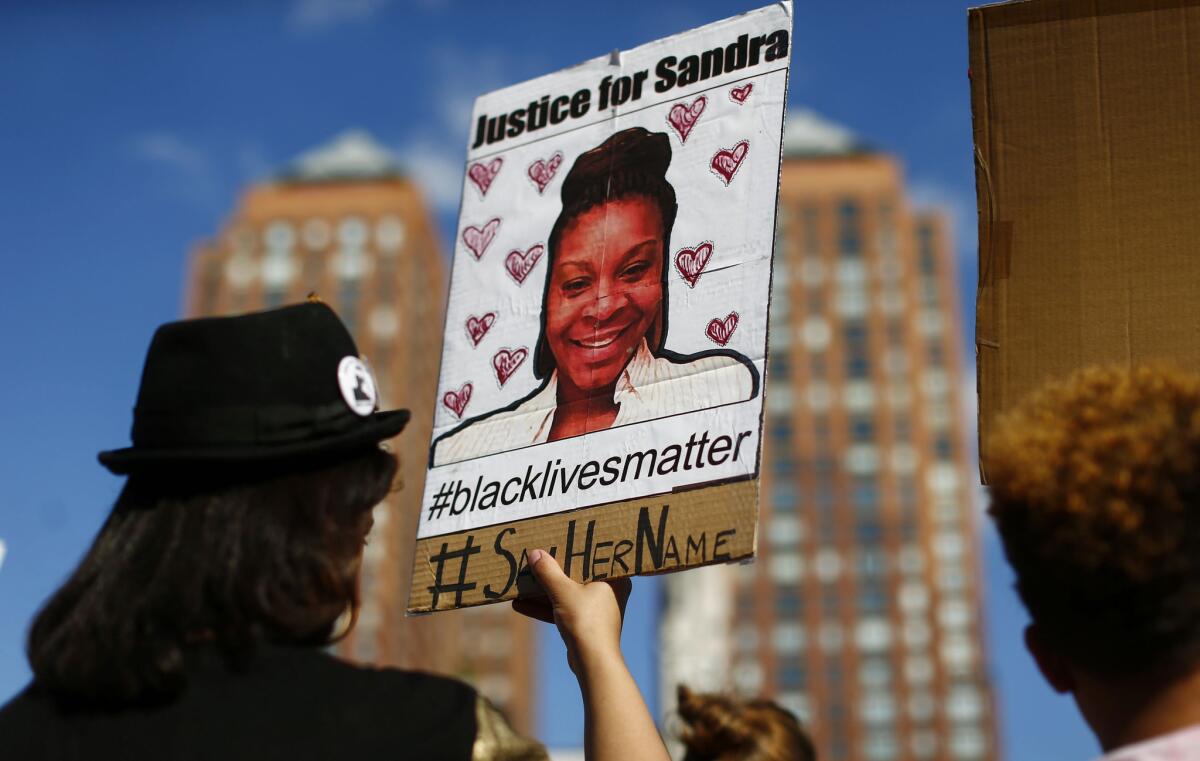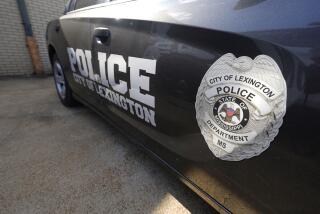Sandra Bland: Texas records show racial breakdown of those stopped by same trooper

A woman with a poster bearing Sandra Bland’s image during a Michael Brown memorial rally in New York on Sunday.
- Share via
Reporting from Houston — The Texas state trooper whose traffic stop of Sandra Bland last month ignited national controversy did not appear to disproportionately stop minority drivers, records show, but a racial profiling expert cautioned that it’s difficult to draw conclusions from the figures.
Trooper Brian T. Encinia, 30, was hired by the Texas Department of Public Safety in January 2014. He reported for on-the-job field training July 14 and started making traffic stops on Aug. 7, 2014, according to records released to the Los Angeles Times last week.
“As is standard during this training period, a new trooper’s [field training officer] will take the lead on traffic stops during the initial phase of training. Therefore, a trooper would not conduct traffic stops immediately upon reporting to the field for duty,” said Summer Blackwell, a department spokeswoman.
NEWSLETTER: Get the day’s top headlines from Times Editor Davan Maharaj >>
Encinia stopped Bland about 50 miles northwest of Houston in Prairie View, Texas, on the afternoon of July 10. The two argued, and he arrested her on suspicion of assaulting an officer. Bland was taken to the Waller County jail, where authorities said she was found dead in her cell three days later, hanged with a trash bag.
Officials ruled her death a suicide, but Bland’s family has questioned the findings and commissioned a second, independent autopsy. They have filed a wrongful death lawsuit in Houston federal court against Encinia, the sheriff, jailers, Waller County and the Texas Department of Public Safety.
According to the records, Encinia had stopped 1,537 drivers since August 2014. He appears to have stopped about the same percentage of African American and white drivers: 34%. About 21% of those he stopped were Latino, 8% were of unknown race, 2% were Asian and one person was Native American.
See the most-read stories this hour >>
Encinia stopped 501 women, 187 of whom were African American (37%), 178 were white (36%), 88 were Latinas (18%), 44 were of unknown race (9%), three were Asian and one was Native American.
The trooper stopped more than twice as many male drivers as female. Of the 1,036 males he stopped, 350 were white (34%) and 336 were African American (32%). Twenty-three percent of the males were Latino, 3% were Asians and 8% were of unknown race.
Phillip Atiba Goff, president of the Center for Policing Equity and a visiting scholar at Harvard’s John F. Kennedy School of Government, said he was struck by how many white drivers Encinia stopped, given that the area where he was working includes Prairie View A&M University, a historically black school in a city that is 89% African American.
About 64% of stops by police in the area last year involved African American drivers, according to the Texas Commission on Law Enforcement, which gathers information under a state statute that prohibits racial profiling by law enforcement. Statewide last year, only about 10% of DPS traffic stops involved African American drivers.
Goff, an associate professor of psychology at UCLA who researches racial profiling, said it’s difficult to draw conclusions from Encinia’s traffic stops alone.
“We don’t know if the driver population mirrors the surrounding community -- they can be wildly different,” he said, “We don’t know what other officers are doing, we don’t know what an appropriate base rate is and we don’t have any national benchmarks for measuring bias and discrimination in police behavior as opposed to disproportionality.”
Goff has been developing a national database of police records that could be integrated with other community data to help create such a “base rate” for pedestrian and traffic stops, he said.
It would help to know how much of the traffic enforcement was driven by Encinia’s department, Goff said. Bland’s stop was filmed by Encinia’s dashboard camera, and it would also help to analyze footage of Encinia’s other stops, Goff said.
“It’s hard to see what this record can tell us when it’s divorced from all the necessary context,” Goff said.
Experts look for red flags that can signal racial profiling, such as “pretextual” traffic stops where drivers are cited for things officers saw only after stopping them.
Encinia stopped 23 drivers for expired drivers licenses -- often considered a pretextual stop -- and six of them were African American. He also stopped 11 drivers for failing to secure a child. All were African Americans or Latinos except for one of unknown race.
Of the 25 drivers he stopped and cited for failing to signal a lane change -- the reason he stopped Bland -- 14 were white and six were African American.
Of the 46 drivers Encinia stopped on the road where he encountered Bland, 37 were African American. They were cited for a variety of offenses, including two others for failing to signal.
The day Encinia stopped Bland, he had stopped two white men and three black women on the same road. He stopped the women for speeding, an expired drivers license and a broken light. He stopped the men for failing to display a driver’s license and driving without license plates.
During the next two days before he was placed on administrative leave, Encinia stopped 22 drivers, more than half of them African American, including eight women cited for, among other things: speeding, failing to report a change of address, obscured lights and license plates.
Bland’s older sister, Sharon Cooper, 31, a Chicago-area businesswoman, told The Times in an interview last week that her family has not heard from Encinia, and she wonders what he was thinking when he stopped Bland.
“I do feel that he targeted her,” Cooper said.
ALSO:
Man shot by police as gunfire erupts during Ferguson protests
9 moments the Internet forced us to think about race
After a year of high-profile killings by police, Americans’ views on race have shifted
More to Read
Sign up for Essential California
The most important California stories and recommendations in your inbox every morning.
You may occasionally receive promotional content from the Los Angeles Times.














